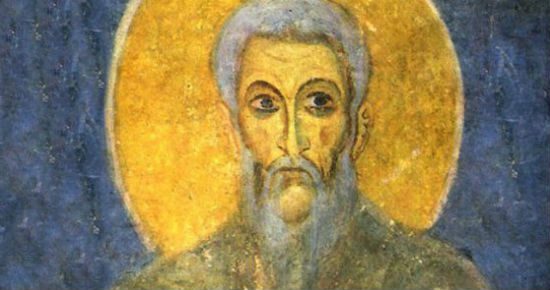Tessa McBrayer wonders whatever happened to Joseph Barsabbas. Me too.
We meet Barsabbas in an odd little story in the first chapter of the book of Acts. “Matthias Chosen to Replace Judas” is the subtitle the NRSV Bible gives to this little vignette. This comes right after Luke tells us that Jesus was “taken up into heaven,” leaving his followers alone down here, gaping at the sky.
So Jesus’ disciples gather together in Jerusalem to pray, along with “certain women, including Mary the mother of Jesus, as well as his brothers.” Not all of Jesus’ original twelve disciples are there, of course. Judas Iscariot is no longer part of the group, having just hung himself and/or leaped from a cliff in remorse for having betrayed Jesus. The remaining eleven disciples decide, then, that they need to name a replacement to fill his empty slot.
Already I have questions. Like what’s the deal, really, with the “12 disciples” bit? They get named and numbered and listed repeatedly throughout the Gospels, so there’s apparently something special about the status or nature of “The Twelve” that distinguished them from the rest of the people following Jesus. But the Gospels also remind us, over and over, that there were a whole bunch of other disciples too — at least 70 explicitly commissioned by Jesus. Those folks — “together with certain women” — were just as loyal, committed and present as the 12, so what distinguishes those 12 from the rest of the group?
I’ve known the names of those 12 disciples ever since I learned that song in Sunday school — “There were 12 disciples, Jesus called to help him …” But that song just underscores the question here. “He has called us too, he has called us too,” we sang.* We’re like them, but also not like them. How? Well, we weren’t there with Jesus all along the way The Twelve were. True, but what about all those others who were?
It’s not hard to find answers to that question, but it’s hard to find answers to that question that don’t involve some huge degree of projecting anachronistic sectarian assumptions back onto the text. Those 12 were special because they were bishops, say the bishops. Or because they were presbyters, say the presbyters. Etc.
Here in the first chapter of Acts, though, whatever it was that made The Twelve distinct was considered important enough that their first order of business was to fill the empty seat and get back to having the apparently necessary quorum of 12.**

And this is where we meet Barsabbas:
So one of the men who have accompanied us during all the time that the Lord Jesus went in and out among us, beginning from the baptism of John until the day when he was taken up from us — one of these must become a witness with us to his resurrection.” So they proposed two, Joseph called Barsabbas, who was also known as Justus, and Matthias. Then they prayed and said, “Lord, you know everyone’s heart. Show us which one of these two you have chosen to take the place in this ministry and apostleship from which Judas turned aside to go to his own place.” And they cast lots for them, and the lot fell on Matthias; and he was added to the eleven apostles.
Again, I have questions.
Like, for instance, the whole casting lots thing. Barsabbas puts down two fingers. Matthias puts down a fist. Rock breaks scissors. This is how the young church has decided to make decisions?
“No one shall be found among you who practices divination,” the law of Moses commands. “The Bible is very clear” about this: Divination is prohibited, unambiguously and repeatedly. It’s also, of course, unambiguously and repeatedly commanded. It was part of the high priest’s job. And it was often practiced, as in this story, by prayerful, faithful believers seeking to discern the will of God. Oiuja boards are cool, apparently, just as long as you pray first to ask God to guide your hands on the little pointer thingie.
In this case, though, the casting of lots was no big deal. The reason they wound up deciding between the two candidates by flipping a coin is because Matthias and Joe Barsabbas were equally qualified — either one would have been a good and worthy and beneficial choice.
But, as Luke just pointed out a few paragraphs earlier, there were also “certain women” right there in the room with them who met all of the criteria Peter describes. Joanna and Susanna and a whole band of Marys had also been with Jesus all along. And unlike almost all of the men — unlike Peter himself — those women had stood by Jesus throughout his trial and execution. The first witnesses to Jesus’ resurrection were some of these women. That seems to make them even more qualified than any of the male candidates, so why was the pool of potential replacements limited to “one of the men“?
This is particularly odd given the unsubtle theme and agenda of the rest of the book of Acts, which hits us with story after story of radical inclusion as the community of Jesus’ disciples expands to include Gentiles, women, Samaritans, queer Africans, and even, eventually, a European. The leading disciples in Jerusalem are portrayed throughout all of that as a bit slow to catch on. They’re playing catch-up as the Spirit races ahead of them.
That’s why I suspect this odd little story is supposed to seem like an odd little story. Pentecost hasn’t started yet. This is the chapter before that. So at this point, when the leadership decides to name a new member of their circle, women and Gentiles and eunuchs and centurions and Samaritans need not apply.
Anyway, they cast lots and the lot falls on Matthias “and he was added to the eleven apostles.” We don’t hear anything about what happened to Joseph Barsabbas after that.***
Some traditions say he went on to become a bishop in the early church, and in that role he was canonized as a saint — St. Justus of Eleutheropolis. That’s a nice story, but it’s almost certainly wrong since at the time of the book of Acts there was no bishop of Eleutheropolis on account of there not yet being an Eleutheropolis.
Still, though, I like the idea of making Barsabbas a saint. He could be the patron saint of the short straw. Seems to me we could use a saint for that.
– – – – – – – – – – – –
* YouTube comes through with a pop-punk rendition of “There Were 12 Disciples” that actually works. I especially like the way the ending really gives Bartholomew his big moment.
https://www.youtube.com/watch?v=2ehzMiMnYhII also notice that most of the versions of this song on YouTube have slightly different lyrics than the ones we sang. This version says, “I am one and you.” I remember singing this as a question and a challenge — “I am one, are you?” I think I prefer the solidarity expressed in the new version to the way we sang it, which always seemed like we were sentinels demanding, “Halt, who goes there?”
** In the story, actually, the main reason Peter argues for adding a new 12th disciple is just to shovel some dirt onto the grave of the traitor Judas. “For it is written in the book of Psalms,” Peter says, “Let another take his position.”
That’s from Psalm 109, which the NRSV titles “A Prayer for Vindication and Vengeance.” Is it ever. “He loved to curse; let curses come on him,” the Psalmist says:
May his days be few;
let another take his position.
May his children be orphans,
and his wife a widow.
May his children wander about and beg;
may they be driven out of the ruins they inhabit.
May the creditor seize all that he has;
may strangers plunder the fruits of his toil.
May there be no one to do him a kindness,
nor anyone to pity his orphaned children.
May his posterity be cut off;
may his name be blotted out in the second generation.
May the iniquity of his father be remembered before the Lord,
and do not let the sin of his mother be blotted out.
Yep, “the sin of his mother.” The Psalmist goes there, bringing his mama into it. And that is what Peter is quoting as the reason they need to name a replacement for Judas. So it’s possible this story has less to do with the meaning or status of The Twelve than it does with the measure of “vindication and vengeance” that could be found in erasing Judas’ place in the community.
*** For that matter, we don’t hear much of anything more about Matthias either. Sure, he’s one of The Twelve, and so he shows up in some later church iconography, but still, when we think of the “12 Disciples,” we tend to think of the original 12 — the guys on either side of Jesus in “The Last Supper.” Nobody plays “Matthias” in youth-group productions of Godspell. He’s not mentioned in the song above. And just try to find a flannel-graph figure of the guy. You can get flannel-graph figures of Barnabus, and Silas — I’ve even seen one of Eutychus — but I don’t think anybody makes one of poor Matthias.












